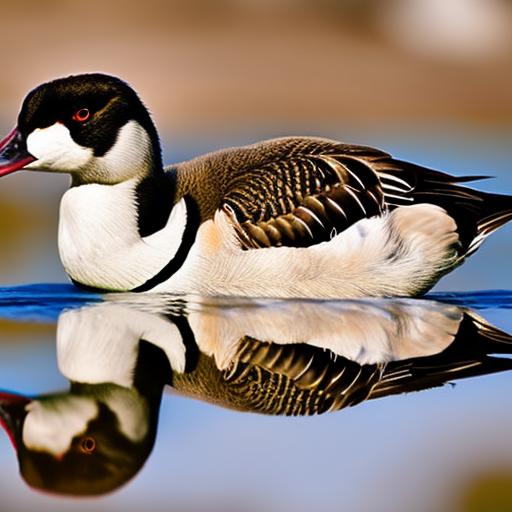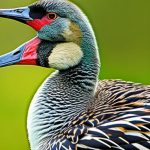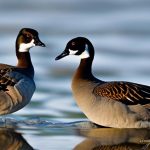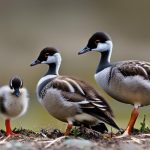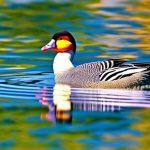Canadian geese, also known as Canada geese, are large waterfowl native to North America. They are easily recognizable by their distinctive black heads and necks, white cheeks, and brown bodies. These geese are known for their honking calls and V-shaped flight formations during migration. Many people are interested in keeping Canadian geese because of their beauty, grace, and the unique experience they provide.
Key Takeaways
- Canadian geese are a common sight in North America and are known for their distinctive honking calls and V-shaped flying formations.
- Understanding the behaviour of Canadian geese is important for keeping them as they are social animals that require companionship and a sense of security.
- Keeping Canadian geese can provide benefits such as natural pest control, entertainment, and even meat and eggs for consumption.
- Challenges of keeping Canadian geese include their large size, potential aggression, and the need for adequate space and resources.
- Legal requirements for keeping Canadian geese vary by location and may include permits, fencing regulations, and restrictions on hunting or culling.
Understanding the Behaviour of Canadian Geese
Canadian geese are highly social birds that form strong pair bonds and live in large flocks. They are known for their migratory patterns, with some populations traveling thousands of miles each year to reach their breeding and wintering grounds. During migration, they fly in a V-shaped formation to reduce wind resistance and conserve energy.
Communication is an important aspect of Canadian goose behaviour. They use a variety of vocalizations to communicate with each other, including honking calls that can be heard from a distance. These calls serve as a way to maintain contact within the flock and warn of potential threats.
Benefits of Keeping Canadian Geese
One of the main benefits of keeping Canadian geese is the aesthetic value they bring to your property. Their graceful presence and striking appearance can enhance the beauty of any landscape. Additionally, having geese on your property can provide natural pest control. Geese feed on grasses, weeds, and insects, helping to keep lawns and gardens free from unwanted pests.
Keeping Canadian geese also provides educational opportunities for children. Observing these birds in their natural habitat can teach children about wildlife conservation, migration patterns, and the importance of preserving natural habitats. It can also foster a sense of responsibility and empathy towards animals.
Challenges of Keeping Canadian Geese
While there are many benefits to keeping Canadian geese, there are also some challenges to consider. One challenge is the mess they can create. Geese produce a significant amount of droppings, which can be unsightly and difficult to clean up. Additionally, their droppings can contribute to water pollution if they are near bodies of water.
During the breeding season, Canadian geese can become aggressive and territorial. They may hiss, flap their wings, or even charge at perceived threats, including humans. This aggressive behaviour can pose a risk to people, especially children, and other animals.
Another challenge of keeping Canadian geese is the potential for property damage. Geese are grazers and can cause damage to lawns, gardens, and crops. They may also nest in unwanted areas, such as on rooftops or near buildings, which can lead to damage and nuisance.
Legal Requirements for Keeping Canadian Geese
Before keeping Canadian geese, it is important to be aware of the legal requirements and regulations in your area. In some places, a permit may be required to keep geese. These permits are typically issued by wildlife agencies or local authorities and may have specific conditions and restrictions.
Failure to comply with regulations can result in fines or other consequences. It is important to research and understand the legal requirements for keeping geese in your area before making the decision to keep them.
Feeding and Caring for Canadian Geese

Canadian geese have specific dietary needs that should be met to ensure their health and well-being. They primarily feed on grasses, aquatic plants, and grains. It is important to provide a balanced diet that includes these food sources.
Water is also essential for Canadian geese. They need access to clean water for drinking and bathing. If you have a pond or lake on your property, it can serve as a natural water source for the geese. However, if you do not have a natural water source, you will need to provide a shallow pool or trough for them.
Basic care and maintenance for Canadian geese include regular cleaning of their living area, providing fresh food and water daily, and monitoring their health. It is important to observe their behaviour and look for any signs of illness or distress.
Housing and Fencing for Canadian Geese
When keeping Canadian geese, it is important to provide appropriate housing and fencing to ensure their safety and well-being. There are various housing options available, including outdoor enclosures, barns, or sheds. The housing should provide protection from predators, extreme weather conditions, and have enough space for the geese to move around comfortably.
Fencing is also important to keep the geese contained and prevent them from wandering off or causing damage to neighbouring properties. The fencing should be at least 3-4 feet high and made of sturdy materials that cannot be easily damaged or knocked down by the geese.
Considerations for outdoor and indoor housing include providing adequate ventilation, lighting, and nesting areas for the geese. It is also important to regularly clean and maintain the housing to prevent the buildup of waste and bacteria.
Health and Disease Management for Canadian Geese
Like any other animal, Canadian geese are susceptible to various health issues. Common health issues in geese include respiratory infections, parasites, and injuries. It is important to take preventative measures to minimize the risk of disease.
Preventative measures include providing a clean living environment, regular veterinary check-ups, and vaccinations if recommended by a veterinarian. It is also important to practice good hygiene when handling the geese or their waste.
If you notice any signs of illness or distress in your geese, it is important to seek veterinary care as soon as possible. Early detection and treatment can help prevent the spread of disease and improve the chances of recovery.
Breeding and Reproduction of Canadian Geese
Canadian geese have specific breeding habits and patterns. They typically form pair bonds that last for life. Breeding season usually occurs in the spring, and during this time, the geese become territorial and aggressive to protect their nesting sites.
The female goose will lay a clutch of eggs, usually 4-7, and both parents take turns incubating the eggs. Incubation takes about 25-30 days, and once the eggs hatch, the goslings are cared for by both parents. The goslings are precocial, which means they are able to walk and swim shortly after hatching.
Caring for goslings involves providing a safe and secure environment, appropriate food and water, and protection from predators. It is important to observe the goslings closely and ensure they are growing and developing properly.
Is Keeping Canadian Geese Right for You?
Keeping Canadian geese can be a rewarding experience, but it also comes with its challenges. It is important to weigh the benefits and challenges before making the decision to keep geese. Considerations include the aesthetic value they bring to your property, their natural pest control abilities, and the educational opportunities they provide.
However, it is also important to consider the mess and noise they can create, their aggressive behaviour during breeding season, and the potential for property damage. Additionally, it is crucial to be aware of the legal requirements and regulations for keeping geese in your area.
If you decide that keeping Canadian geese is right for you, it is important to provide appropriate care and housing for them. This includes providing a balanced diet, clean water, and a safe living environment. Regular monitoring of their health and seeking veterinary care when necessary is also important.
Overall, keeping Canadian geese can be a rewarding experience for those who are willing to put in the time and effort to care for these beautiful birds.
If you’re interested in learning more about how to keep Canadian geese, you might find this article on Poultry Wizard helpful. It provides valuable information on how to care for goslings, including tips on feeding, housing, and general care. Check it out here for expert advice on keeping these beautiful birds happy and healthy.
Meet Walter, the feathered-friend fanatic of Florida! Nestled in the sunshine state, Walter struts through life with his feathered companions, clucking his way to happiness. With a coop that’s fancier than a five-star hotel, he’s the Don Juan of the chicken world. When he’s not teaching his hens to do the cha-cha, you’ll find him in a heated debate with his prized rooster, Sir Clucks-a-Lot. Walter’s poultry passion is no yolk; he’s the sunny-side-up guy you never knew you needed in your flock of friends!

